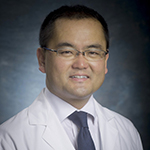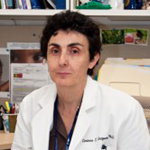 Dr. James Markert
Dr. James Markert
The UAB Department of Neurosurgery ranked No. 10 nationally in 2017, according to rankings provided by the Blue Ridge Institute for Medical Research, receiving more than $3.6 million in funding from the National Institutes of Health, nearly doubling the department’s 2016 funding.
The 2017 funding comprised five awards, two of which were new to UAB, held by James Markert, M.D., Ichiro Nakano, M.D., Ph.D., Corinne Griguer, Ph.D., and M. R. Chambers, M.D., D.V.M.
 Dr. Ichiro Nakano
Dr. Ichiro Nakano
Markert, chair of the Department of Neurosurgery, and Nakano, professor of neurosurgery, each received more than $500,000 in 2017 funding. Markert’s recently funded clinical trial evaluates the safety and tolerability of using the M032 oncolytic herpes virus to help fight malignant gliomas, while Nakano’s ongoing brain tumor and stem cell research analyzes the molecular characterization of brain cancer heterogeneity and plasticity.
 Dr. Corinne Griguer
Dr. Corinne Griguer
“One approach to brain tumor treatment that we are considering now is a combination of viral and immunotherapy,” Markert said. “The viral therapy using our modified herpes virus should produce a highly effective immune response, followed by introduction of the checkpoint inhibitors, which would turn on the checkpoints and activate individual T cells.”
Griguer, who received more than $800,000 in 2017 funding for her ongoing malignant glioma research, is a biochemist focused on the bioenergetic pathways involved in malignant glioma development and progression, while Chambers is using her expertise in veterinary medicine to study the relationships between canine and human brain tumors in a research project that earned more than $1.5 million in funding in 2017.
 Dr. M. R. Chambers
Dr. M. R. Chambers
“There are many shared factors between people and their pet dogs,” she said. “Dogs live in our houses, sharing the same environment and the same sleep patterns, for example. Some lucky dogs even share their owner’s diet. It is not unreasonable to assume that the dog will be a highly useful model of human brain tumors.”